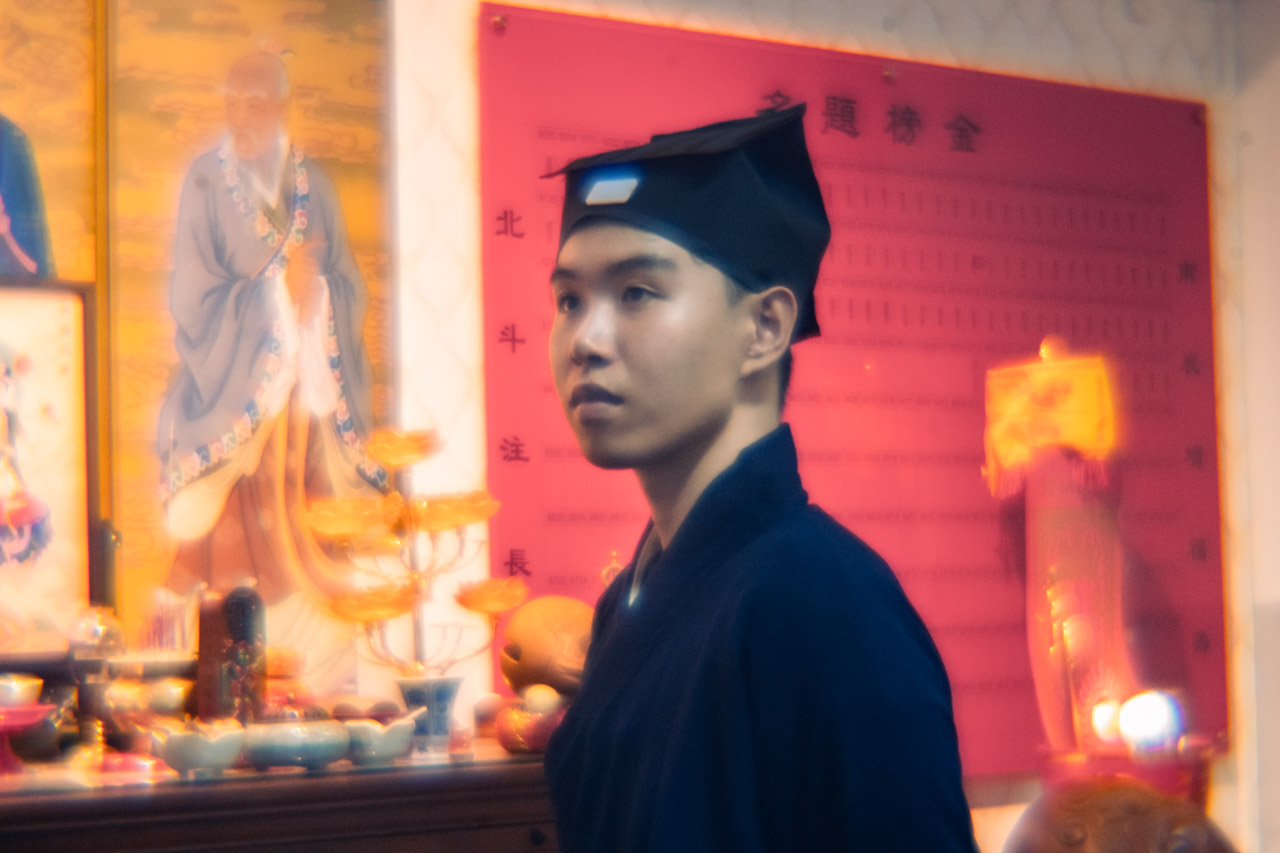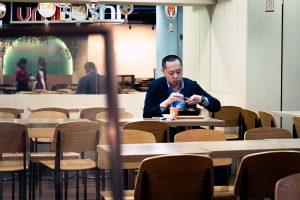All images by Stephanie Lee for RICE Media
Polaroid snaps, a cat condo, and a neon ‘Open’ sign greet me when I set eyes on Lee Chee Tong’s room. Quintessential Gen Z vibes.
But as my colleagues and I shuffle in, small details pop out—hinting that the room’s occupant isn’t exactly like other youngsters his age. A thick tome of Taoist scriptures at the foot of his bed; a mu yu (a fish-shaped percussion instrument) atop a shelf; calligraphy brushes dangling alongside cheery group photos.
Chee Tong is a final-year social work student at the National University of Singapore. The 24-year-old is also an ordained Taoist priest.
He gives us the rundown of his knick-knacks, most of which are used in rituals he performs. The mu yu, for example, sets the rhythm for chants. The religious texts are part of his ‘homework’ as a junior priest, and he has to recite them twice a day—once in the morning and again in the evening.
Our photographer asks about the teapot and teacup at the foot of his bed, probably expecting it to be part of some Taoist ritual.
“Oh, I just like tea,” Chee Tong deadpans.
What’s in a God?
Chee Tong wasn’t always religious. He was raised in an atheist family, and his parents are free-thinkers. They’re supportive nonetheless—his ordination certificate occupies a spot on their wall of family photos.
Chee Tong’s journey from atheism to Taoism goes against the trend of Singaporeans turning their backs on religion. According to the 2020 Singapore Census, 20 percent of the population holds no religion, an increase from 17 percent in 2010.
Perhaps it was the lack of religious influence in his childhood that left him with a strong curiosity about the meaning of life. Chee Tong says he was a “weird child” who would incessantly ask his parents questions about where he came from. His parents would feed him euphemisms about “eggs and worms”, he says, laughing at the memory.
His first brush with religion came only in junior college when a friend brought him to church. He took to the teachings and found Christian values (loving your neighbour, etc.) beautiful. But there was also an element of fear that drove him to church, he admits—he was afraid of going to hell.
Then came National Service, a tumultuous period for Chee Tong. He went through some personal struggles and was “not in the best place”, he says. At his lowest point, he remembers slumping to the floor, looking up, and thinking: “There must be more to life.”
In his quest for spiritual fulfilment, he researched different religions, reading up on everything from Islam to Baha’i.
It was in 2021 that he discovered Taoism—thanks to a mysterious man who kept appearing in his dreams.
Since he was about three or four years old, Chee Tong remembers recurring dreams where an old man would speak to him and show him visions, he claims.
“He always appeared with a very long beard and long hair in a bun. White hair. He looked a bit like Dumbledore.”
This same old man urged him to check out Taoism. He never thought too much of it, but Chee Tong believed there was no harm in following the man’s advice.
A Google search led him to Quan Zhen Cultural Society, a group of Taoist priests and practitioners. He signed up for a course on Taoist scripture, not knowing it was for trainee priests. In the scriptures, he found wisdom, he says.
So he stuck with it. Within two years, he was ordained as a priest.
“Other religions—maybe I understand it wrongly—seek to define who God is or what the divine is. But one of the first Taoist scriptures I read said, ‘The Tao (or way of the universe) that can be named is not the Tao.’”
It resonated deeply with him. He loved how Taoism is, at its core, about existing in harmony with the universe and self-improvement.
Besides introspectiveness, Taoism encourages the accumulation of good karma through performing good deeds.
Believers also take part in rituals where they pray to various Taoist deities such as Guan Yin for blessings, and chant scriptures to alleviate the woes of spirits in the underworld.
At Quan Zhen, most priests hold full-time day jobs and only accept a nominal sum for the rituals they conduct. The amount is entirely up to their beneficiaries, usually just enough to cover their transport costs.
Most do it for the passion, not the money, says Chee Tong. Upon graduation, he plans to do the same: Be a full-time social worker while continuing his priestly duties on the side.
None of us are devout Taoists, so he gets creative with the analogies as he explains his duties, where he mainly assists senior priests at rituals.
He describes the practice of throwing baos to the spirits as a “donation drive” and chanting scriptures as “counselling sessions” for them. The main goal for his rituals is to feed the hungry spirits and ease their suffering, he says.
Chee Tong cites the ancient Chinese religion’s concept of wu wei, or going with the natural flow of things, when I ask if he’s sure that he’s found the religion for him.
“When I know it is the right one, naturally, my body flows. It’s very easy. There wouldn’t be rejection inside my heart. I feel grounded and at peace.”
Though he gave up Christianity for Taoism, there were no hard feelings between him and the friends he made from church.
“They might not understand, but they are respectful. I think that’s something that I really love about them. So that’s why, until now, we are still friends.”
Straddling Modernity and Priesthood
It’s pretty rare to come across an uber-religious Gen Z-er these days. It’s rarer yet to find someone his age actively pursuing priesthood.
While older generations might have relied on religion for purpose (and as barometers of morality), their descendants aren’t doing the same. As per the 2020 Singapore Census, 24.2 percent of those aged 15 to 24 had no religion, compared to 15.2 percent of those 55 and above.
Chee Tong tells me that his friends at school are usually surprised when they find out about his priesthood, but it’s simply become a party conversation.
“They’ll be like, ‘So you can catch ghosts?’” he laughs. Alas, while being a ghostbuster would be cool, he’s not in the business of catching supernatural entities.
It’s easy to forget his age when he delves deep into Taoist philosophy. But ever so often, the Gen Z in him peeks through.
He’s mostly calm and collected, though he gets exponentially more animated when he makes small talk with us off-camera. “You’re 30? You look like a poly student!” he exclaims when my colleague reveals her age.
The final-year university student also doesn’t shy from regaling wild college party stories. At the same time, he’s also disciplined enough to go on a vegetarian diet and abstain from alcohol for a few days before rituals to keep himself “pure”.
His duality shines through in the selection of tomes on his bookshelf: an interesting mix of science and psychology, as well as thick religious texts. Some are photocopied and bound with plastic spines, reminiscent of study notes.
As I watch Chee Tong explain the more mystical aspects of Taoism—such as invoking qi (or energy) during rituals, receiving blessings from gods, and ‘counselling’ spirits with scriptures—I can’t help but wonder how he reconciles science and the supernatural.
After all, he clearly believes in the supernatural to some degree. He tells us of a ritual Quan Zhen Cultural Society conducts every seventh month of the lunar calendar to invoke the gods.
Whenever the ritual is conducted, the clouds will darken and a strong wind picks up. Yet, the candles on the altar remain still. After the gods are invoked, everything “magically turns back to normal”, he says.
At the same time, Chee Tong also strikes me as a logic-driven person. That is to say, he isn’t one to believe in baseless superstitions. For example, he’s the proud owner of a black kitten named Happy.
Chee Tong pauses to think when I ask how he can believe in both science and the supernatural. It’s a big question—and a heavy one, he says.
“Like science reactions, there’s always a process. A happens to produce B. In our mystical spells, it’s kind of similar.”
He takes the analogy a little further, likening rituals that supposedly cleanse departed souls of their impurities to the chemical process of distillation.
Taoists believe that spirits in the underworld aren’t able to rise to heaven because of impurities in their soul.
During the ji lian portion of Taoist rituals, which Chee Tong translates as ‘alchemy’, priests use the elements of fire and water to “alchemise” the soul, burning impurities away.
Taoists believe in a philosophy called correlative cosmology, he says. In a nutshell, this is the belief that everything in this world is connected, and the different elements of earth, air, water, metal, and fire affect each other.
It’s similar to the traditional Chinese medicine belief in approaching health issues holistically and identifying disharmony in the body instead of treating patients based on isolated symptoms.
“So similarly, for spells or when we use talismans, it transmutes these elements from the physical realm to the metaphysical realm.”
One Like, One Prayer
It is a lot to wrap your head around. But Chee Tong is doing his part to eschew the gatekeeping culture he says is prevalent in Taoism.
Not only does he balance school and his work as a priest, but he’s also a bonafide TikTok content creator with about 4,000 followers. Pretty impressive for a page that posts mostly Taoist content.
After all, there’s been a marked decline in practising Taoists here. In 1980, Taoists made up 20 percent of the population. That number dropped to just 8.8 percent in the 2020 census.
Chee Tong sees his TikTok presence as a unique opportunity to spread awareness of an ancient religion.
Taoism, regarded as both a philosophy and a religion, has long been shrouded in mystery, he says. The older generation, and even some religious leaders, tend to wave off questions. But there’s a reason that some like to gatekeep Taoism, he says.
“When you go deeper into Taoism, there is the mystical part of it. So this mystical part of it cannot be easily shared with others because you have to ensure the person’s intention is good. So there’s a lot of checks, a lot of gatekeepers.”
But an unintended side effect is people end up going through the motions without actually understanding Taoist philosophy, he says.
With his bite-sized TikToks, Chee Tong hopes to demystify Taoism and explain the reasons behind certain practices, such as offering joss sticks.
The fact that most Taoist texts are in Chinese (and are so hard to parse without in-depth classes with religious leaders)doesn’t help its accessibility. To combat it, Chee Tong does his best to simplify Taoist philosophy for TikTok, distilling his learnings into slideshows set against songs like Playboy Carti’s ‘Magnolia’.
His content has generally been well-received. He shares that he’s even received a few DMs thanking him for introducing Taoism to the masses.
On the rare occasion that he gets hate comments—mostly from Christians accusing him of devil worship or leaving Christianity “for a statue”—he remains unfazed.
“I know that this is coming from a place of ignorance. They don’t understand. So that’s why I don’t get very angry. But maybe I’ll tease them with comments,” he says, adding that he sees it as a chance to educate even more people.
Finding Purpose Amid Uncertainty
Followers of Abrahamic religions believe in heaven and hell. Those who follow Hinduism, Sikhism, Buddhism, or Jainism tout some form of reincarnation. Others believe that death means fading into black.
Before speaking to Chee Tong, I wasn’t sure why someone raised as an atheist would devote their time and energy to finding a religion. Especially in an era when his peers are turning away from deities or the divine in favour of nihilism.
While Chee Tong firmly embraces Taoism as his faith, he maintains a profound awareness of its enigmatic aspects, including the uncertainty surrounding the existence of an afterlife.
“What is the real meaning of life? Why do we exist? I don’t think anyone will ever find out for sure,” he muses.
Even among all the unknowns of life (and the afterlife), it’s commendable that at the tender age of 24, he’s already found his purpose: to help others. Whether as a social worker or a Taoist priest.
“Death, or the afterlife, is just another journey from the world of the living. So why only help the living?”






